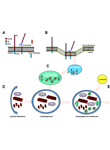|
|
|
Modulation of autophagy as a therapeutic target for Alzheimer’s disease
|
|
|
|
|
|
|
|
|
|

|
|
|
|
John W. Steele, Emily Fan, Yildiz Kelahmetaglu, Yuan Tian, Victor Bustos
|
|
|
|
Rockefeller University.
|
|
Laboratory of Molecular and Cellular Neuroscience. Rockefeller University, New York, NY 10065
|
|
jsteele@rockefeller.edu
|
|
|
|
|
|
|
|
|
|

|
|
Macroautophagy(autophagy) is a conserved cellular pathway that regulates the degradation oflong-lived proteins, protein aggregates, and cellular organelles. Autophagy isessential for maintaining neuronal homeostasis; however, neuronal autophagicefficiency decreases with age. Therefore, aging is one of the greatest riskfactors for development of Alzheimer’s disease (AD), a slowly progressing formof neurodegeneration that develops over the course of 10-20 years prior to theonset of overt clinical symptoms. AD is defined neuropathologically by the presenceof extracellular aggregates of the amyloidogenic protein amyloid-b (Ab) and intracellularaccumulation of the microtubule-asssuggesting that an intimate association mayexist between neuronal autophagy stasis and Alzheimer’s-relatedpathology. Here,we highlight recent evidence that the autophagic pathway plays a role in boththe generation and clearance of the pathogenic Ab protein and its precursors.The primary focus of this review......
|
|
|
|
|
|
|
|

|
|